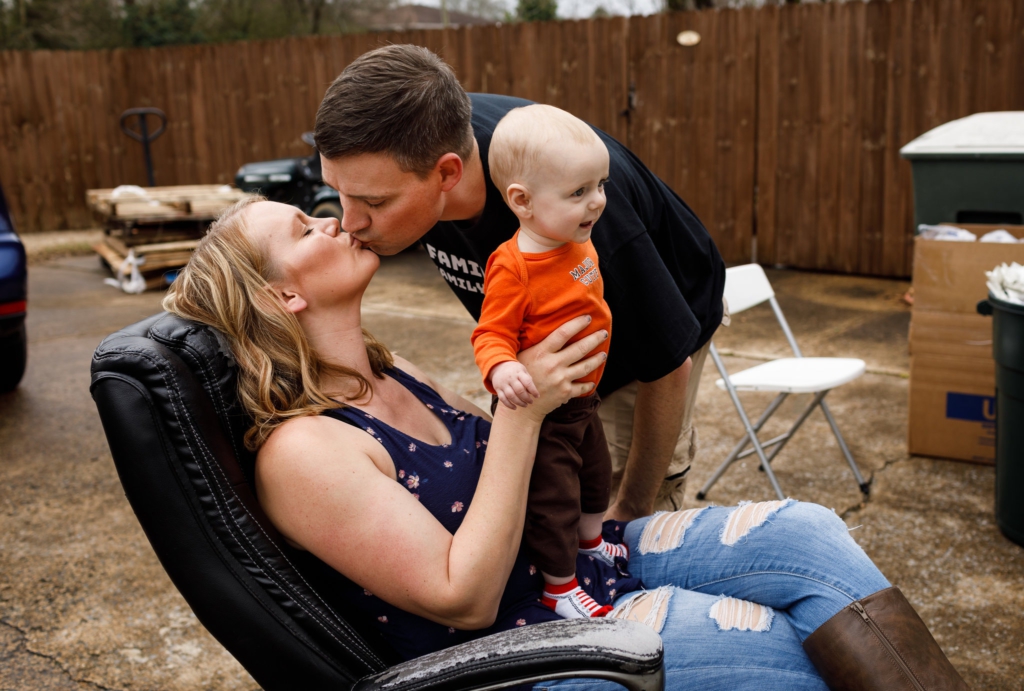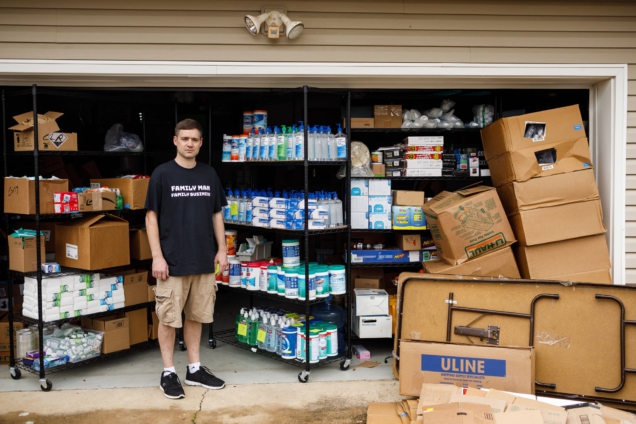On March 1, the day after the first coronavirus death in the United States was announced, brothers Matt and Noah Colvin set out in a silver S.U.V. to pick up some hand sanitizer. Driving around Chattanooga, Tenn., they hit a Dollar Tree, then a Walmart, a Staples and a Home Depot. At each store, they cleaned out the shelves.
Over the next three days, Noah Colvin took a 1,300-mile road trip across Tennessee and into Kentucky, filling a U-Haul truck with thousands of bottles of hand sanitizer and thousands of packs of antibacterial wipes, mostly from “little hole-in-the-wall dollar stores in the backwoods,” his brother said. “The major metro areas were cleaned out.”
Matt Colvin stayed home near Chattanooga, preparing for pallets of even more wipes and sanitizer he had ordered, and starting to list them on Amazon. Mr. Colvin said he had posted 300 bottles of hand sanitizer and immediately sold them all for between $8 and $70 each, multiples higher than what he had bought them for. To him, “it was crazy money.” To many others, it was profiteering from a pandemic.
The next day, Amazon pulled his items and thousands of other listings for sanitizer, wipes and face masks. The company suspended some of the sellers behind the listings and warned many others that if they kept running up prices, they’d lose their accounts. eBay soon followed with even stricter measures, prohibiting any U.S. sales of masks or sanitizer.
Now, while millions of people across the country search in vain for hand sanitizer to protect themselves from the spread of the coronavirus, Mr. Colvin is sitting on 17,700 bottles of the stuff with little idea where to sell them.
“It’s been a huge amount of whiplash,” he said. “From being in a situation where what I’ve got coming and going could potentially put my family in a really good place financially to ‘What the heck am I going to do with all of this?’”

Mr. Colvin is one of probably thousands of sellers who have amassed stockpiles of hand sanitizer and crucial respirator masks that many hospitals are now rationing, according to interviews with eight Amazon sellers and posts in private Facebook and Telegram groups from dozens more. Amazon said it had recently removed hundreds of thousands of listings and suspended thousands of sellers’ accounts for price gouging related to the coronavirus.
Amazon, eBay, Walmart and other online-commerce platforms are trying to stop their sellers from making excessive profits from a public health crisis. While the companies aimed to discourage people from hoarding such products and jacking up their prices, many sellers had already cleared out their local stores and started selling the goods online.
Now both the physical and digital shelves are nearly empty.
Mikeala Kozlowski, a nurse in Dudley, Mass., has been searching for hand sanitizer since before she gave birth to her first child, Nora, on March 5. When she searched stores, which were sold out, she skipped getting gas to avoid handling the pump. And when she checked Amazon, she couldn’t find it for less than $50.
“You’re being selfish, hoarding resources for your own personal gain,” she said of the sellers.
Sites like Amazon and eBay have given rise to a growing industry of independent sellers who snatch up discounted or hard-to-find items in stores to post online and sell around the world.
These sellers call it retail arbitrage, a 21st-century career that has adults buying up everything from limited-run cereals to Fingerling Monkeys, a once hot toy. The bargain hunters look for anything they can sell at a sharp markup. In recent weeks, they found perhaps their biggest opportunity: a pandemic.
As they watched the list of Amazon’s most popular searches crowd with terms like “Purell,” “N95 mask” and “Clorox wipes,” sellers said, they did what they had learned to do: Suck up supply and sell it for what the market would bear.
Initially, the strategy worked. For several weeks, prices soared for some of the top results to searches for sanitizer, masks and wipes on Amazon, according to a New York Times analysis of historical prices from Jungle Scout, which tracks data for Amazon sellers. The data shows that both Amazon and third-party sellers like Mr. Colvin increased their prices, which then mostly dropped when Amazon took action against price gouging this month.
Latest Stories
-
Jordan Ayew spreads New Year cheer to Liberian orphans
5 minutes -
John Mahama’s Re-election: A testament to perseverance, discipline, and divine purpose
34 minutes -
Armah-Kofi Buah reminds Akufo-Addo of his failed National Cathedral promise to God
49 minutes -
We’ll soon see the true colours of the umbrella – Afenyo-Markin
56 minutes -
Our autonomy will enable us run innovative courses – Founder of Garden City University
57 minutes -
Drawing inspiration from adversity: Asare-Bediako Addo urges young people to learn from Derek Redmond’s unforgettable story
1 hour -
Daily Insights for CEOs: Building resilient leadership teams for sustainable growth
2 hours -
Full text: Akufo-Addo delivers final State of the Nation Address
2 hours -
Welding in a 24-hour economy: Part 1
2 hours -
Second edition of BAL Exhibition thrills fans in Accra, setting the stage for 2025 season
2 hours -
I leave behind a Ghana that is working – Akufo-Addo
2 hours -
Thousands attend second edition of Amerado’s ‘My Motherland’ concert at Ejisu
2 hours -
Amaju Pinnick stopped me from filing injunction against GFA elections – George Afriyie
2 hours -
Akufo-Addo’s tenure will be a timely reminder of how not to govern a country – Armah-Kofi Buah
2 hours -
History will be kind to Akufo-Addo’s unmatched record in education – Afenyo-Markin
2 hours

